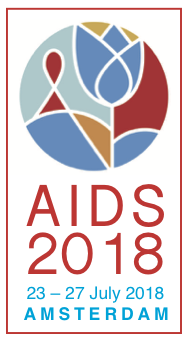Daily and on-demand PrEP both prevent HIV in Prévenir study: high adherence by gay Parisians
3 August 2018. Related: Conference reports, HIV prevention and transmission, World AIDS 22 Amsterdam 2018.
 Simon Collins, HIV i-Base
Simon Collins, HIV i-Base
Interim results from the PREVENIR (“prevent”) study, presented by Jean-Michel Molina in a press conference and as a late-breaker oral abstract at the AIDS 2018 conference in Amsterdam, continue to show the high efficacy of PrEP. [1, 2]
No new HIV infections were reported when oral TDF/FTC was taken in either daily or on-demand dosing (only using PrEP when needed).
The study, predominantly in gay men, reported very high levels of adherence. This is an ongoing open label study that provided PrEP to all participants and also allowed participants to choose their dosing strategy when appropriate. Women and transgender people are only recommended to use daily dosing in order to achieve protective drug levels. Men in the study were able to use less frequent dosing and were also able to switch between dosing strategies during the study.
The three-year Prévenir study was designed to find out how PrEP was used outside of a randomised study and to look at whether PrEP would reduce new infections in a real-world setting.
Prévenir started in May 2017 and has already enrolled more than 1600 of the planned 3000 adults at 22 HIV centres in Paris. The study hypothesis is that this level of PrEP use should show a 15% reduction in new infections among gay men in the city. HIV, creatinine and STI testing is recommended every three months, but is flexible based on the decision of the treating doctor. Participants also provide anonymised confidential information including about their sexual activity, partner numbers and pattern of PrEP use.
Baseline characteristics so far include median age 36 years (IQR: 30 to 44), with approximately 8% aged between 18 to 25. Although the study aimed for 85% gay men, so far very few participants are either heterosexual (0.8%) or transgender (0.5%). Roughly half the participants are single, roughly half have previously used PrEP, and chemsex was also common (used by 40% within the previous year).
Roughly half the participants chose on-demand dosing, with the only significant baseline differences being that these people were having sex slightly more often and with a higher median number of partners (15 vs 10 in the previous 3 months, p<0.001).
So far, 1102 participants have reported having sex 2279 times (1088 vs 1191 times in daily vs on demand groups), with PrEP covering >95% vs 81% of these times, respectively. Adherence was defined as taking at least one dose before sex and one after, with a 24-hour window period allowed for each dose. Condom use was also reported for about 20% of times people had sex in both groups. This might show that when PrEP was missed in the on demand group, participants compensated by using condoms.
Mean follow-up time is 7 (SD +/– 4) months, with 443 vs 506 participant years of follow up (PYFU) in the daily vs on demand groups respectively.
The principal efficacy results are that there have been no new HIV diagnoses in either group, with HIV incidence at 0 and upper 95%CI of 0.8 vs 0.7 in daily vs on demand groups. Based on historical incidence of 9.1/100 PY in the IPERGAY study, Prévenir has already prevented 85 HIV infections.
Approximately 3% of participants have discontinued the study, but none were due to side effects. Acute viral hepatitis was reported in 11 people, with 7/11 cases of hepatitis C, with no difference between groups.
Over time there were few behaviour differences reported between arms, but a possible trend for participants in both groups to have slightly more sex, interestingly, with fewer partners.
Note: this report has been published before the main conference presentation because of the IAS policy of choosing to hold press conferences before rather than after the researchers have presented their full results.
The report is based on early press access to the presentation slides. The embargo was lifted at the start of the related press conference but this report will be updated, if appropriate, after the full presentation.
comment
As well as adding to efficacy and safety data on PrEP, these early results show that gay men in Paris have high adherence levels and high retention in the study.
Similar to the UK IMPACT study, uptake by heterosexual and transgender communities is much less than for gay men whose PrEP awareness is already high.
Results on the impact of PrEP on HIV incidence in the Paris region are still pending.
References
- AIDS 2018 press conference. Prévenir study results. Tuesday 24 July 2018. 9.00 am.
http://www.aids2018.org/Media-Centre/Resources/Press-programme - Molina J-M et al. Incidence of HIV-infection in the ANRS Prévenir study in Paris region with daily or on-demand PrEP with TDF/FTC. AIDS 2018, 23-27 July 2018, Amsterdam. Late breaker oral abstract WEAE0406LB.
http://programme.aids2018.org/Abstract/Abstract/13278

